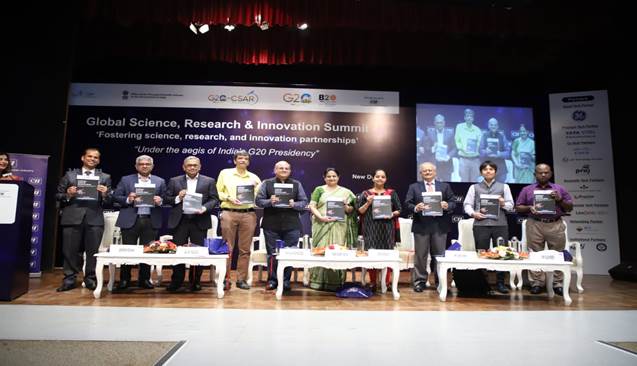Govt says mulling over making Indian Patent Act more simplified and research friendly
Ten News Network

New Delhi (02/05/2023): Government today said that it is mulling over making Indian Patent Act more simplified and research friendly for product-oriented results.
Addressing the Global Science, Research and Innovation Summit organized by CII titled “Fostering Science, Research and Innovation Partnerships’ under the aegis of the India’s G20 Presidency at IIT Delhi, Dr Akhilesh Gupta, Senior Adviser at the Department of Science and Technology (DST), Government of India said, while India grants average of 23,000 patents per annum, despite having over 1000 Universities, it is over 5 lakhs in China. He said, India lacks the culture of Patents filing and taking it to its logical conclusion.
Dr Gupta, who is also Secretary of the Science and Engineering Research Board (SERB) said that time duration of patents filing and grant of patents is 3 years in India, while the global average is two years.
According to NEP-2020, all funding agencies of Research in the country will merge into a single entity – National Research Foundation (NRF) with an objective to catalyse quality research in our country. It will have twin objectives of basic research and high-quality innovation.
Referring to around .69 percent of budget being spent on R&D in India, Dr Gupta said, private sector must pitch in with higher research allocation to match and support governed for a win-win proposition.
He said, last month the National Quantum Mission (NQM) was approved by the Union Cabinet at a total cost of Rs.6003.65 crore from 2023-24 to 2030-31, aiming to seed, nurture and scale up scientific and industrial R&D and create a vibrant & innovative ecosystem in Quantum Technology (QT). This will accelerate QT led economic growth, nurture the ecosystem in the country and make India one of the leading nations in the development of Quantum Technologies & Applications (QTA), Dr Gupta added. Similarly, Private Sector can also come in a big way to support the National Mission on Interdisciplinary Cyber Physical System.
Dr Gupta said, DST is working hard to completely re-orient and transform the R&D Infrastructure of 350 State Universities, which are in very poor condition in collaboration with State Governments.
Earlier, at the inaugural session Dr Parvinder Maini, Scientific Secretary in the Office of Principal Scientific Adviser to the Government of India said that Government, Industry, Academia and Start-Ups all should join hand to Co-Produce and Co-Develop world class products and solutions, as the era of working in silos is over now.
She underlined that the main reason and the huge gap of the low R&D budget of India is due to almost non-participation of private sector to take big risks in emerging and cutting -edge technologies.
Dr Maini said, out of 90,000 start-ups in India, only 12,000 are technology-based and also only about 3,000 of them are deep tech start-ups. She said, unless industry will not lend funding support to innovative and bright ideas, India will miss the bus, which is now on its way to full bloom.
Prof K.P Sudheer, Ex-Officio Principal Secretary, S&T Department, Government of Kerala in his address said that 4 Science Parks will be established in Kerala in coming days with participation from Industry and Start-Ups. He also informed that Kerala is the only state in the country with a separate R&D budget document and this year the allocation was Rs 3500 crore.
Prof Sudheer giving the example of Partnering Academic Industrial Research (PAIR) scheme, said that it is intended to promote translational research through academia – industry linkage. The scheme envisages to identify a researcher, who works towards Ph.D. or Post-Doctoral programme with the partnering institute concerned.
Prof Rangan Banerjee, Director, IIT, Delhi in his address announced that IIT-D will start M-tech in Robotics this year and appealed to Industry to support this mission. He said, CII should work with Industry to sponsor at least 300 to 400 Ph.D. through a new model to develop market ready products.
Ryuhei Nishi, First Secretary, S&T, Embassy of Japan said, India and Japan are natural allies and human resources of both the countries should join hands to deliver the best STI products matching global standards. He lamented and said that there is need for increasing more people to people contact and informed that only 1000 Indian students are there in Japan, which is 8 times less than China.
Vipin Sondhi, Chairman, CII National Mission on Technology, Innovation 7 Research and Alok Nanda, Co-Chair National Mission on Technology, Innovation & Research Dr Ashish Mohan, Executive Director, CII also addressed the gathering.
Earlier, three CII Thought Leadership Reports on Advanced Materials, Women in STEM and Industry-Academia collaboration were released.

